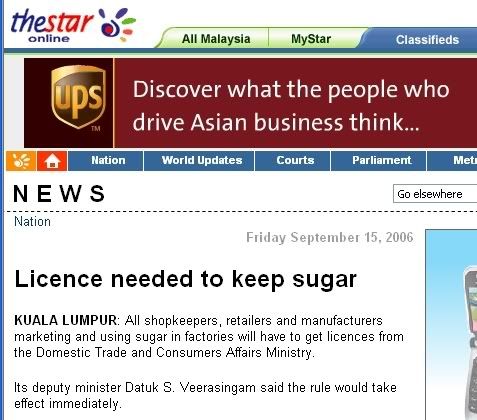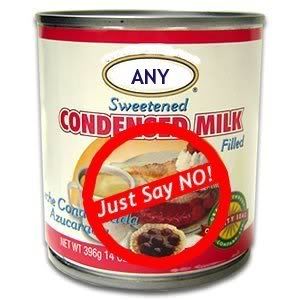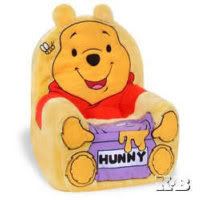License to ill...
"Technorati tags: Malaysia, Health, Sugar, Honey
It had to happen sooner or later... and sure enough, this news article from The Star confirmed Walski's prediction:
 Like firearms and diesel, you now need a license to sell sugar
Like firearms and diesel, you now need a license to sell sugar
Walski gave up his direct sugar intake a few years back, primarily for health reasons. No, Walski's not diabetic (thank God for that), but there is a long and sordid history of it in the family. So, the no-sugar-in-the-diet thing is a precautionary measure, more than anything else.
And in the process, Walski's acquired a taste for food as they should be - without the added element of risk sugar.
The sad truth is that Malaysians consume too much damn sugar. And too much sugar in the diet is not a good thing - in fact, it puts a heavy strain on your metabolic systems, possibly leading to pancreatic failure, a.k.a. diabetes.
But it's very difficult to entirely eliminate sugar from the diet. The modern day, processed foods contain plenty of sugar - a sh*tload of it, in fact. Particularly in so-called healthy foods, such as fruit juices. And you wonder why there are so many obese kids nowadays...
Walski's sugar-watch tip: Always read the Ingredients label of any processed food, before you purchase it. If the first ingredient says sugar, it's best not to buy that particular brand. Food ingredients are usually listed in order of percentage (by volume or weight), with the largest percentage listed first. Although sugar occurs naturally in a lot of fruit juices, commercial products usually add sugar. The ingredients-label of most sugar-spiked fruit juices usually lists Sugar as the first ingredient - you're probably getting more sugar than juice goodness!
The next time you happen to be in a supermarket, just have a look at the ingredients contained in any processed food, and Walski guarantees you that you'll find Sugar listed close to the top of the list, if not the first ingredient listed.
And the single largest sugar-contributing food item to the Malaysian diet?
(more sugary ranting in the full post)
 You'll find more SUGAR than Milk in this can
You'll find more SUGAR than Milk in this can
Apart from crystalized processed sugar, probably Sweetened Condensed Milk. Which really should be called Condensed Milk-flavored Sugar - it actually contains more sugar than milk - if you don't believe Walski, just have a look at what's listed first on the ingredients list. Which is exactly the reason why Walski calls this abomination Condemned Milk.
But for you folks out there who simply cannot do without a sweetened cup of coffee (or tea), there is a simple, un-licensed, but more importantly, healthier alternative - honey.
Honey is much better than non-dairy creamer, which is made from corn syrup (which contains sugar), vegetable oil solids and milk (or soy) protein derivatives. So basically, it does have some sweetness in it already - if you want to wean yourself away from sugar, using a non-dairy creamer in the interim may be a solution, but honey and fresh milk would probably be better.
The taste of honey may take a little getting used to, but it's much healthier than processed sugar, and just as sweet (Walski thinks it's sweeter). When buying honey, though, the less processed the better.
Or better yet, do what Walski does with his coffee - fresh full-cream milk and nothing else (except for the coffee, of course).
 Honey, in addition, has other non-sweetening therapeutic properties. It is a good, natural energy boosting food, it is a natural anti-oxidant, it helps speed up your body recovering from influenza and colds (see this old myAsylum post) - with the help of Vitamin C and B-Complex, plus it can be used as a topical antiseptic on cuts and minor burns (honey also contains hydrogen peroxide, but in smaller quantities compared to the commercial 3% variety).
Honey, in addition, has other non-sweetening therapeutic properties. It is a good, natural energy boosting food, it is a natural anti-oxidant, it helps speed up your body recovering from influenza and colds (see this old myAsylum post) - with the help of Vitamin C and B-Complex, plus it can be used as a topical antiseptic on cuts and minor burns (honey also contains hydrogen peroxide, but in smaller quantities compared to the commercial 3% variety).
In Malaysia, one can find many different varieties of honey, in just about any convenience store or supermarket. The less it has been processed, though, the better. Taste-wise, honey is influenced by where it is produced, particularly what variety of flowers contribute to the pollen collected by honey bees.
This explains why different batches of honey from the same producer may have a slight variation in taste from time to time. But the larger honey manufacturers have taken this into account and usually grow the honey bees in non plant-diverse controlled areas.
Sugar, on the other hand, is usually nothing but empty calories. Particularly the processed ultra-clean white crystalline kind. From a health perspective, raw sugar (like real gula melaka) is a lot better.
While some people may raise hell about not being able to sell sugar more freely, now that you'll need a license, the latest move by the authorities may have a good side-effect. Hopefully, Walski's fellow Malaysian will look for healthier sweetening alternatives.
And while honey may be more expensive compared to sugar, but we don't want to put a price-tag on our health, now, do we?
















